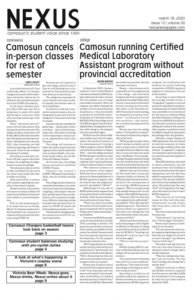COVID-19 anxiety is ubiquitous. Camosun College recently released a statement informing students that in-person classes have been cancelled for the rest of the semester (see page 1). The University of Victoria also cancelled classes. Glenlyon Norfolk has, as well, closed early as a precautionary measure.
This virus is dominating the news and our minds. But I think much of these fears are misplaced.
I don’t wish to tell people they’re wrong for addressing this issue pragmatically. Nor do I wish to dismiss the significant implications coronavirus presents for many in our community.

What I would like to do is draw attention to the very real effects an outbreak might have on our healthcare system. Let’s talk about the people who are hoarding toilet paper yet are barely washing their hands. Think of the wildly individualistic ways people have been responding to this news.
A chemical and biomolecular engineer recently posted a thread on Twitter. She broke down the ways that viruses spread and how that might impact healthcare delivery.
She explained that viruses spread exponentially—especially the ones we might be able to carry without symptoms, or with less severe symptoms.
We have three acute-care hospitals in the Victoria area, with fewer than 1,000 beds total. There are approximately 367,770 people living in Greater Victoria, meaning there are approximately 2.4 beds for every 1,000 people.
This is comparable to the numbers that the engineer calculated for the United States. With about 10 percent of cases requiring hospitalization, it’s estimated that the US could run out of hospital beds by early May.
However, we are not the United States. We have access to healthcare, meaning people are more likely to treat their symptoms. We are preparing—Camosun has waived the requirement for doctor’s notes for students and employees who are self-isolating, and it seems that schools are bracing to close. People are being cautious.
The nature of a lot of that caution, though, has been unreasonable and panic-driven. The reckless hoarding of toilet paper and hand sanitizer by those who can afford it, the obsession with masks despite the nature of the pathogen, the jaw-dropping racism I’ve been seeing online—these are symptoms of a culture that has become so self-interested it can no longer see the value in addressing this issue collectively.
Handwashing for more than 20 seconds (try the chorus to “Landslide”) is the most effective way to prevent transmission. And if you’re so worried about quarantine, get a bidet attachment for your toilet! You’ll spend the same amount as your stockpile, and, bonus—you’ll have a cleaner butt.
Most facemasks aren’t effective at preventing viral transmission. Viruses are far smaller than the particles they’re designed for. Surgical masks can help you keep your germs to yourself, but best to just stay home.
Viruses are indiscriminate. Racism is garbage and so are people who think Asian people are more likely to have COVID-19.
While we have been, so far, lucky here on the island, with a low rate of infection and high degree of precaution from the institutions that serve us, it’s important we realize that we must be in this together. Humans are inventive, resourceful, and resilient. As with every other outbreak of the last 20-plus years, we will eventually mitigate the risks and figure out how to keep people safe.
We can’t do that alone.
